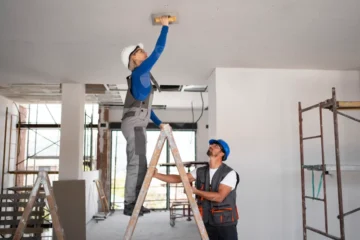Transforming Indoor Spaces & The Future of Building Control Systems

As we journey further into the 21st century, technology continues to transform every aspect of our lives, including the spaces we inhabit. In Thailand, where the blend of tradition and modernity is a part of daily life, there’s an increasing focus on making indoor environments more comfortable, energy-efficient, and adaptive to human needs. At the heart of this transformation are advanced building control systems that promise to redefine how we interact with our living and working spaces. As these systems evolve, they not only offer practical solutions for energy management but also open up new possibilities for enhancing our quality of life through smart building automation.
The integration of cutting-edge technology into building control systems is not just a trend but a revolution in how buildings function. Traditional methods of managing lighting, heating, cooling, and ventilation are being replaced by sophisticated systems that can learn from their environment and adjust accordingly. This evolution is particularly relevant in Thailand’s urban centres like Bangkok, where high-rise buildings dominate the skyline and efficient resource management is crucial due to both economic considerations and environmental sustainability.
One of the remarkable benefits of modern building control systems is their ability to optimise energy consumption. By employing sensors and AI-driven algorithms, these systems can precisely regulate energy use based on real-time data about occupancy levels and external weather conditions. For instance, smart thermostats can anticipate changes in temperature by analysing weather forecasts or recognising patterns in user behaviour. This level of intelligent control leads to significant reductions in energy waste, a critical advantage as Thailand moves towards greener initiatives.
Beyond energy efficiency, smart building automation enhances comfort within indoor spaces by fostering a healthier environment for occupants. Indoor air quality (IAQ) has become an essential consideration in contemporary architecture due to its impact on wellbeing and productivity. Advanced ventilation systems equipped with pollutant sensors ensure that air remains fresh by automatically adjusting airflow when necessary. In a bustling city such as Bangkok where pollution levels can spike unpredictably, maintaining healthy IAQ provides immense benefits to residents’ health.
Moreover, these technological advancements contribute greatly to security enhancement within buildings. Integrated surveillance cameras paired with motion detectors provide comprehensive monitoring capabilities that help safeguard against unauthorised access or emergencies such as fire outbreaks. In Thai culture where community safety holds significant importance, having robust security measures integrated seamlessly into daily life aligns with societal values while offering peace-of-mind.
Finally, the flexibility offered by modern building control systems is transforming architectural design itself. Architects now have greater freedom to incorporate innovative design elements that once seemed impractical due to limitations posed by traditional infrastructure components. With adaptable technologies at their disposal, such as automated lighting that enhances aesthetic appeal or blinds that adjust for optimal natural light exposure, designers can create more dynamic environments tailored specifically for varied uses ranging from residential complexes to commercial offices throughout Thailand.
The future of indoor spaces is bright with possibilities thanks to transformative advancements in building control systems. As Thailand embraces these changes amidst its rapidly developing urban landscape, the potential for creating smarter living environments becomes increasingly attainable through smart building automation technology. These innovations not only lead us toward sustainable practices but also enrich our everyday experiences within built environments, enhancing comfort while promoting well-being across diverse settings throughout this vibrant











